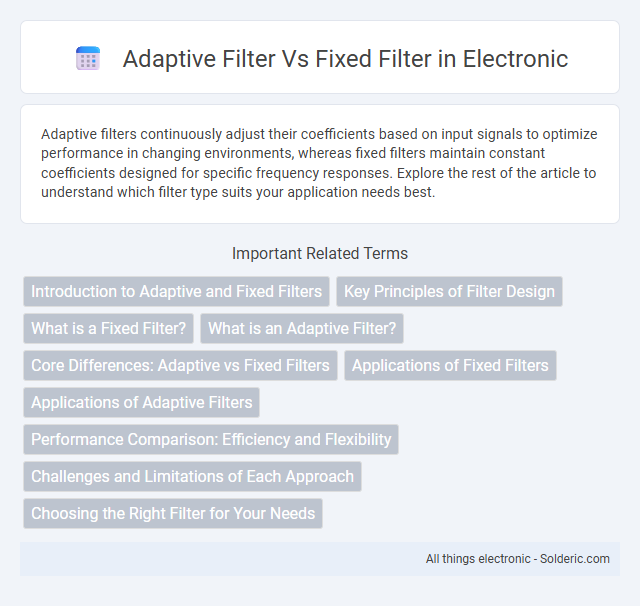Adaptive filters continuously adjust their coefficients based on input signals to optimize performance in changing environments, whereas fixed filters maintain constant coefficients designed for specific frequency responses. Explore the rest of the article to understand which filter type suits your application needs best.
Comparison Table
| Feature | Adaptive Filter | Fixed Filter |
|---|---|---|
| Definition | Filter that self-adjusts its parameters based on input signals | Filter with constant, pre-defined parameters |
| Parameter Adjustment | Dynamic, real-time adaptation | Static, no change during operation |
| Use Cases | Noise cancellation, echo suppression, channel equalization | Signal smoothing, frequency selection, basic filtering |
| Complexity | High, requires algorithm and computational resources | Low, simple design and implementation |
| Performance in Changing Environments | High, adapts to varying signals and noise | Low, performance degrades if input conditions vary |
| Examples | LMS filter, RLS filter | Butterworth filter, FIR filter |
Introduction to Adaptive and Fixed Filters
Adaptive filters automatically adjust their coefficients based on input signal characteristics, enabling real-time noise cancellation and system identification in dynamic environments. Fixed filters use predetermined coefficients designed for specific frequency responses, offering stable performance in static conditions. The choice between adaptive and fixed filters depends on application requirements, signal variability, and computational resources.
Key Principles of Filter Design
Adaptive filters continuously adjust their coefficients based on input signal characteristics and error minimization algorithms like LMS or RLS, enabling dynamic response to changing environments. Fixed filters maintain constant coefficients determined by predesigned specifications, delivering stable frequency responses for well-defined applications. The choice between adaptive and fixed filters hinges on whether the filtering scenario demands real-time adaptability or consistent performance under known conditions.
What is a Fixed Filter?
A fixed filter is a signal processing tool with unchanging parameters designed to filter specific frequency components consistently. Unlike adaptive filters that adjust based on input signal variations, fixed filters maintain a stable frequency response ideal for predictable and stationary environments. Your system benefits from fixed filters when consistent filtering without dynamic modifications is required for reliable performance.
What is an Adaptive Filter?
An adaptive filter is a dynamic signal processing tool that automatically adjusts its coefficients to minimize the error between its output and a desired signal, making it ideal for environments with changing noise or signal characteristics. Unlike fixed filters with static parameters, adaptive filters use algorithms like LMS (Least Mean Squares) or RLS (Recursive Least Squares) to continuously update based on real-time input data. This capability enables applications in echo cancellation, noise reduction, and system identification where signal properties vary over time.
Core Differences: Adaptive vs Fixed Filters
Adaptive filters dynamically adjust their coefficients based on input signal variations and noise conditions, making them ideal for environments with changing signals. Fixed filters use predetermined coefficients and provide consistent filtering performance, suitable for stable and predictable signal environments. Your choice depends on whether signal characteristics remain constant or require real-time adaptation for optimal filtering results.
Applications of Fixed Filters
Fixed filters are widely used in applications requiring stable and consistent frequency response, such as audio equalizers, radio receivers, and signal conditioning in communication systems. Their preset frequency characteristics make them ideal for tasks like noise reduction, channel selection, and harmonic filtering where signal properties remain constant. Industries like telecommunications, broadcasting, and instrumentation rely on fixed filters for reliable and repeatable signal processing.
Applications of Adaptive Filters
Adaptive filters excel in applications requiring dynamic real-time signal processing, such as echo cancellation in telecommunications, noise suppression in hearing aids, and adaptive noise control in automotive systems. They continuously adjust filter coefficients based on changing signal characteristics, making them ideal for time-varying environments like speech enhancement and channel equalization in wireless communication. Fixed filters, by contrast, are suited for static filtering tasks where signal properties remain constant, limiting their effectiveness in scenarios demanding continuous adaptation.
Performance Comparison: Efficiency and Flexibility
Adaptive filters offer superior performance in dynamic environments by continuously adjusting filter coefficients to minimize error, enhancing efficiency in non-stationary signal processing. Fixed filters maintain constant coefficients, providing stability and low computational cost but lacking the flexibility to respond to varying signal conditions. The trade-off between adaptive filter flexibility and fixed filter simplicity determines optimal application based on the requirement for real-time adaptation versus consistent performance.
Challenges and Limitations of Each Approach
Adaptive filters face challenges such as increased computational complexity and the risk of instability or slow convergence in non-stationary environments. Fixed filters struggle with limited flexibility, as they cannot adjust to changing signal characteristics, leading to suboptimal performance in dynamic conditions. Both approaches require a trade-off between adaptability and resource efficiency, impacting their effectiveness based on specific application requirements.
Choosing the Right Filter for Your Needs
Choosing between an adaptive filter and a fixed filter depends on the specific requirements of your signal processing task. Adaptive filters are ideal for environments with varying noise and signal characteristics, as they continuously adjust their parameters to optimize performance. Fixed filters, on the other hand, offer simplicity and stability for applications with consistent frequency requirements and predictable signal behavior.
adaptive filter vs fixed filter Infographic

 solderic.com
solderic.com